Herbs For Inflammation In 2024: 7 Best Herbs & How To Use

Inflammation is often the root cause of chronic pain and illness. While pharmaceuticals such as paracetamol and ibuprofen are well-known and promoted, the long-term side effects are sometimes not worth it. Many people use natural remedies to manage inflammation, such as herbs or anti-inflammatory diets.
Herbs good for inflammation have been used for centuries to improve overall health and wellness. Some of the most effective anti-inflammatory herbs have active components that help reduce inflammation differently. Let’s look at the seven best herbs for inflammation and see if something is out there that could help you!
Top 7 Anti-Inflammatory Herbs
Herbs good for inflammation include:
- Turmeric: It contains an active compound called curcumin, which has been studied to show its powerful anti-inflammatory. properties.
- Ginger: Helps to reduce inflammation by targeting pro-inflammatory molecules.
- Boswellia: Extracts from this plant have evidence to show it may be an effective treatment for people with osteoarthritis.
- Green Tea: Tea leaves are rich in compounds called polyphenols, which have anti-inflammatory properties.
- Rosemary: Rosemary is being researched for its anti-inflammatory effects and antioxidant properties.
- Chinese Skullcap: Contains flavonoids like baicalin, which have antioxidant and anti-inflammatory properties.
- Licorice root: The active constituent is glycyrrhizin, which has anti-inflammatory and immune-modulating properties.
What Is Inflammation?
Inflammation is the body’s natural response to injury, infection, or irritation. It may be surprising that it is a protective mechanism[1] that helps the body eliminate harmful stimuli, such as pathogens, damaged cells, or irritants, and initiate the healing process. Inflammation can be classified into two types: acute and chronic.
Acute inflammation is a short-term response usually lasting a few hours to several days. Acute inflammation occurs when the immune system sends white blood cells and other substances to the injured or infected area to begin healing.
Chronic inflammation is a long-term, persistent response lasting for months or even years. It is often the result of unresolved acute inflammation, an autoimmune disorder, or exposure to a long-term irritant. Chronic inflammation can contribute to[2] the development of various inflammatory chronic diseases, including heart disease, diabetes, arthritis, fatty liver disease, and certain types of cancer.
Can Herbs Help With Inflammation?
When needed, managing and reducing inflammation through lifestyle changes, diet, and herbs is essential to fight inflammation. Compounds in some herbs can modulate inflammatory responses by interacting with various cellular pathways involved in the inflammation process.
Some key mechanisms through which these herbs for pain relief and inflammation exert their effects include:
- Inhibition of pro-inflammatory enzymes: Certain bioactive compounds can inhibit the activity[3] of enzymes that promote inflammation. By blocking the action of these enzymes, they help reduce the production of inflammatory markers and cytokines.
- Modulation of immune cell activity: Certain bioactive compounds can influence the function of immune cells,[4] promoting the activity of anti-inflammatory, immune cells while suppressing the activity of pro-inflammatory immune cells, thereby helping to restore balance in the immune system and reduce inflammation.
- Antioxidant effects: Many herbal compounds possess antioxidant properties,[5] which can help neutralize free radicals that contribute to oxidative stress and inflammation. These compounds can help protect cells from damage and limit the inflammatory response by reducing oxidative stress.
Which Herbs Help Reduce Inflammation?
There are a multitude of different herbs for inflammation and swelling. Herbs have been used for centuries in various traditional medicine systems, such as Chinese herbs for inflammation, to help alleviate symptoms and promote overall health. There are even herbs for anxiety!
Some herbs that contain a variety of bioactive compounds that exhibit anti-inflammatory properties include turmeric, Huang qin, gan cao, rosemary, fang feng, licorice root, and ginger, but some herbs have more research to back up their claims than others, which is why we have compiled a list of some of the best.
7 Best Herbs For Inflammation
Here is a list of the top 7 herbs that are scientifically proven to reduce inflammation:
Turmeric
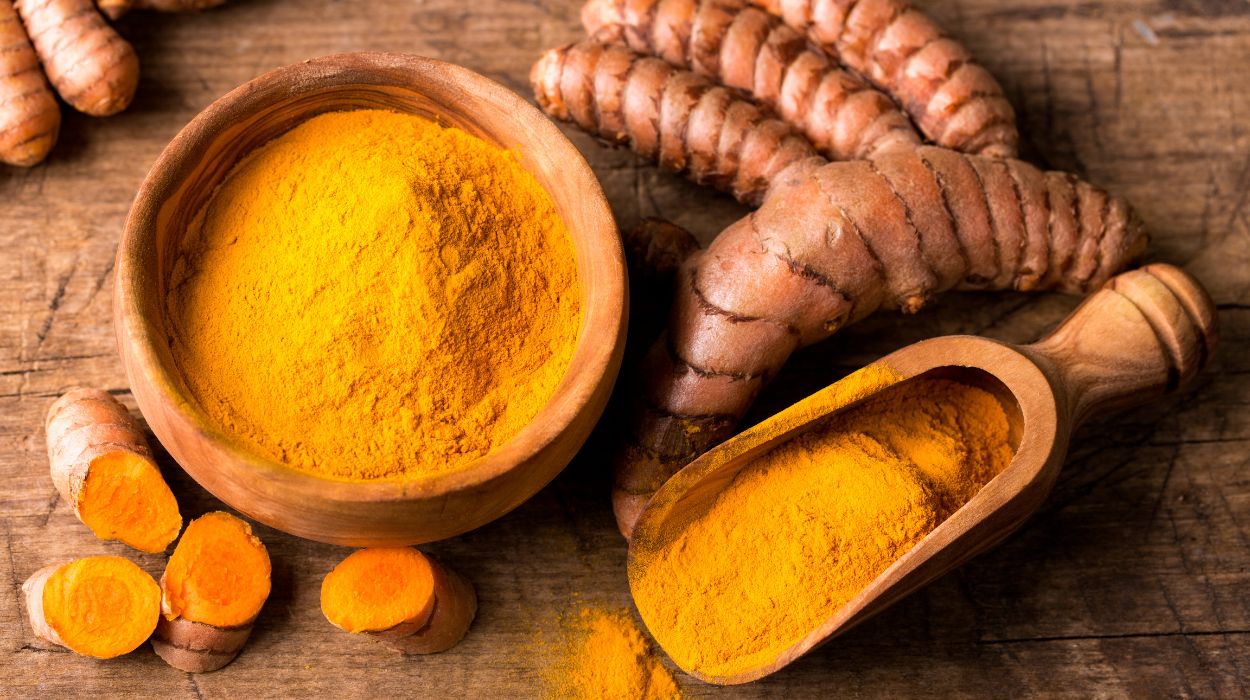
Native to Southeast Asia and India, turmeric is best known as a spice in soups and curries. It contains an active compound called curcumin, which has been studied to show its powerful anti-inflammatory effects.[6] Research suggests curcumin targets inflammation by suppressing inflammatory enzymes.
Ginger
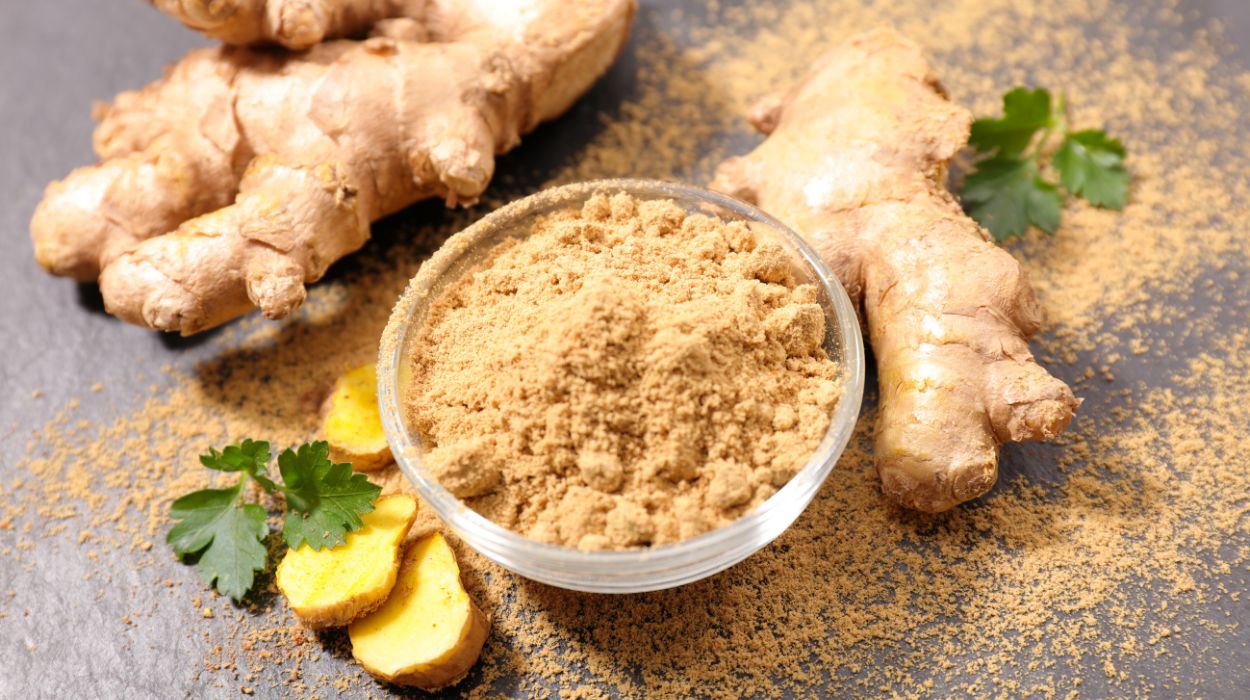
Ginger root contains compounds called gingerols and shogaols[7] which reduces inflammation by targeting pro-inflammatory molecules. Ginger has been studied in many conditions, including rheumatoid arthritis and osteoarthritis, where it was found to have a beneficial effect on joint mobility, pain, and stiffness.
Boswellia

Boswellia is native to India and North Africa and contains boswellic acids. Active compounds from this plant have shown it may be an effective treatment for people with osteoarthritis.[8]
Green Tea
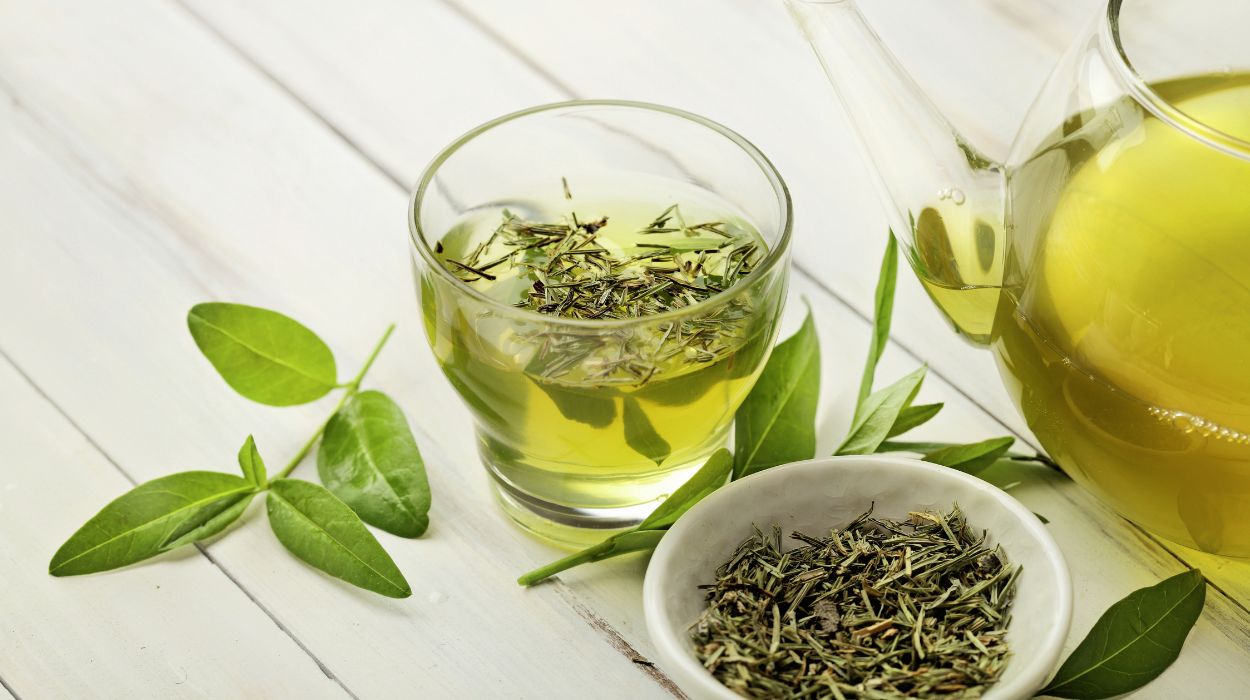
Most widely consumed in its beverage form, green tea leaves can also be found in supplements and are rich in compounds called polyphenols, which have anti-inflammatory properties. These compounds have many health benefits and have been recently shown to help improve the symptoms of inflammatory bowel diseases[9] such as Crohn’s disease.
Rosemary
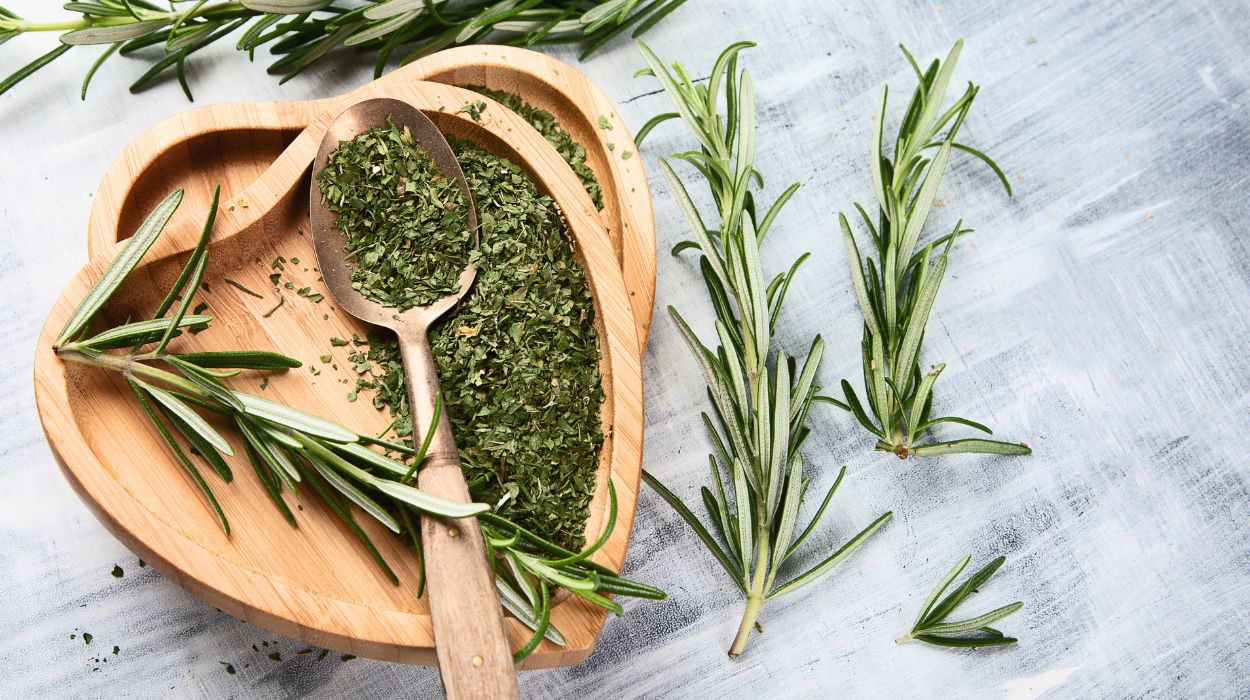
Rosemary, a popular Mediterranian herb used in cooking, is being researched for its anti-inflammatory effects and antioxidant properties,[10] particularly in topical cosmetic use and haircare in its essential oil form.
Huang Qin
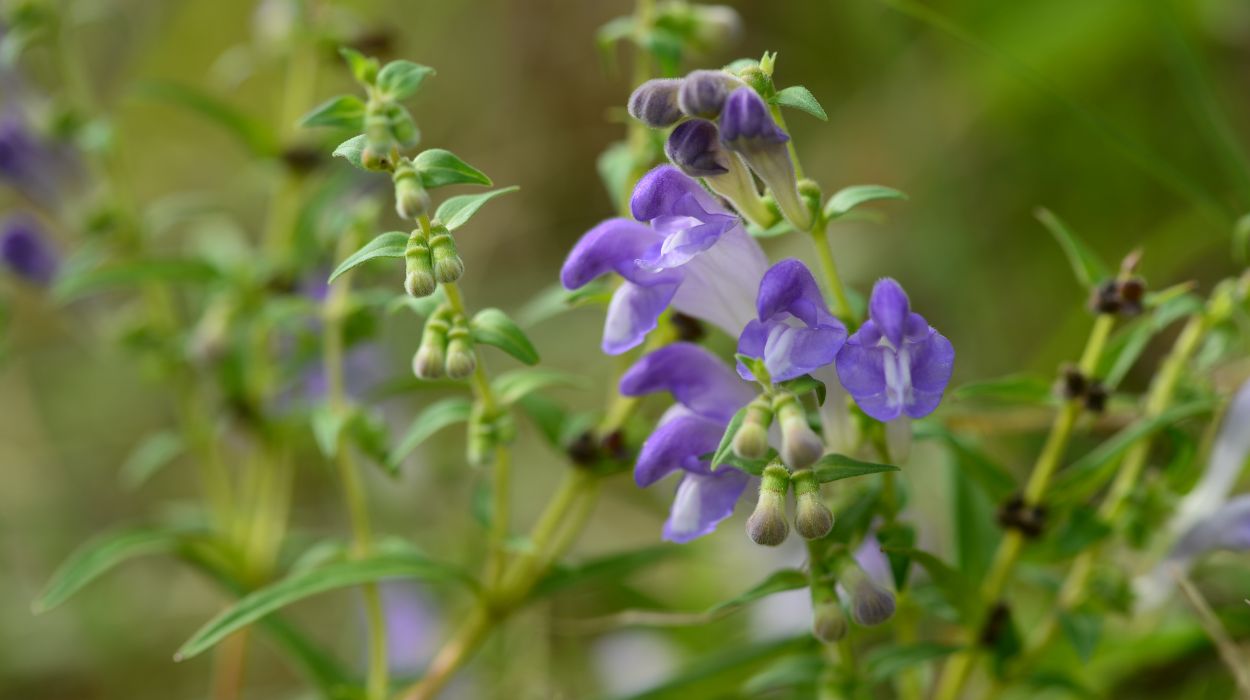
Also known as Chinese skullcap, this herb is usually consumed as a tea or tincture and sometimes in capsule form. It contains flavonoids,[11] which exhibit antioxidant and anti-inflammatory properties by binding to chemokines (cytokines that attract white blood cells to sites of infection).
Gan Cao
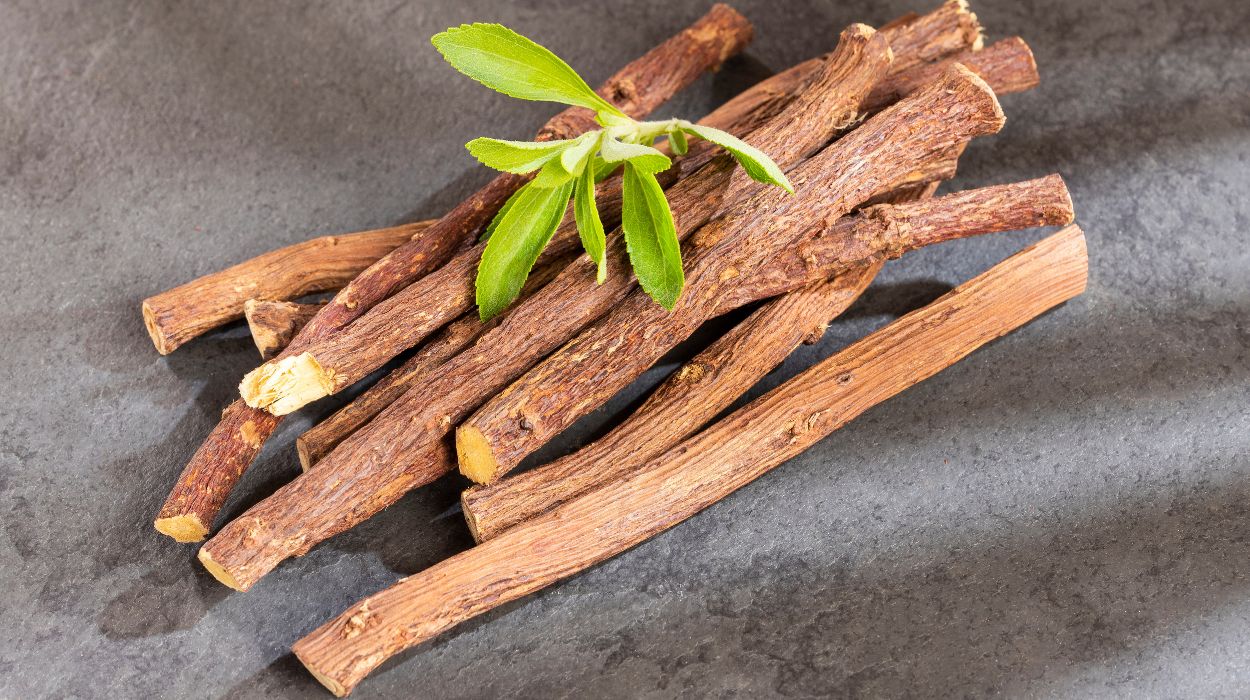
Also known as licorice root, this herb is consumed as a tea, tincture, or capsule. Its active constituent[12] has anti-inflammatory benefits and immune-modulating properties that may reduce inflammation that contributes to the development of cardiovascular disease. It is also known for fighting infections.
How To Use Herbs For Fighting Inflammation
There are several ways to use anti-inflammatory compounds, and the effectiveness of each method may vary depending on the herb, the individual, and the specific condition being treated. For example, curcumin absorption from turmeric is notoriously challenging, so it is often sold in capsule form as curcumin extract or with ingredients such as black pepper to aid absorption.
For best results, consult with a registered dietitian experienced in integrative medicine to determine which method is best for you, including:
- A tea or infusion.
- A tincture or concentrated liquid extract.
- Capsules or tablets.
- As an additive to protein powders.
- Topical creams, oils, and gels.
- Incorporated as herbs and spices into cooking for anti-inflammatory food.
- Aromatherapy.
Risks And Side Effects
Like anything that may have a beneficial effect on the body, they also may have side effects. Just because they are natural compounds used for inflammation doesn’t mean everyone will tolerate them. Discussing the potential risks of herbal remedies with your healthcare provider, particularly if you are also taking other medications or supplements to relieve inflammation, is essential.
Some individuals may be allergic to certain anti-inflammatory herbs, leading to symptoms like itching, rash, swelling, or difficulty breathing. Herbs can also interact with certain medications, either enhancing or diminishing their effects. For example, turmeric may interfere with blood thinners, while licorice root may be unsafe for those with blood pressure issues.
Certain herbs may also be unsafe for pregnant or breastfeeding women, as they can negatively affect the developing fetus or pass through breast milk.
To minimize risks and side effects, always start with the lowest recommended dose of a herb and gradually increase it, if needed, under the guidance of a healthcare professional.
Summary
Anti-inflammatory herbal medicines can be an excellent treatment for chronic inflammation. It is best to work with a registered dietitian experienced in integrative medicine to determine what herbs or tinctures may be best for your particular condition and to ensure they will not interact with any other medications or supplements you may be taking.
+ 12 sources
Health Canal avoids using tertiary references. We have strict sourcing guidelines and rely on peer-reviewed studies, academic researches from medical associations and institutions. To ensure the accuracy of articles in Health Canal, you can read more about the editorial process here
- Chen, L.-J., Deng, H., Cui, H., Fang, J., Zuo, Z., Deng, J., Li, Y., Wang, X. and Zhao, L. (2015). Inflammatory responses and inflammation-associated diseases in organs. [online] 9(6), pp.7204–7218. doi:https://doi.org/10.18632/oncotarget.23208.
- Furman, D., Campisi, J., Verdin, E., Carrera-Bastos, P., Targ, S., Franceschi, C., Ferrucci, L., Gilroy, D.W., Fasano, A., Miller, G.W., Miller, A.H., Mantovani, A., Weyand, C.M., Nir Barzilai, Goronzy, J.J., Rando, T.A., Effros, R.B., Lucia, A., Kleinstreuer, N. and Slavich, G.M. (2019). Chronic inflammation in the etiology of disease across the life span. [online] 25(12), pp.1822–1832. doi:https://doi.org/10.1038/s41591-019-0675-0.
- Adebayo, S.A. and Amoo, S.O. (2019). South African botanical resources: A gold mine of natural pro-inflammatory enzyme inhibitors? [online] 123, pp.214–227. doi:https://doi.org/10.1016/j.sajb.2019.03.020.
- Pasqua, G., Vitalone, A. and Silvia Di Giacomo (2020). Plant-Derived Nutraceuticals and Immune System Modulation: An Evidence-Based Overview. [online] 8(3), pp.468–468. doi:https://doi.org/10.3390/vaccines8030468.
- Foss, K., Katarzyna Przybyłowicz and Martínez-Villaluenga, C. (2022). Antioxidant Activity and Profile of Phenolic Compounds in Selected Herbal Plants. [online] 77(3), pp.383–389. doi:https://doi.org/10.1007/s11130-022-00989-w.
- Hewlings, S. and Kalman, D.S. (2017). Curcumin: A Review of Its Effects on Human Health. [online] 6(10), pp.92–92. doi:https://doi.org/10.3390/foods6100092.
- Ballester, P., Begoña Cerdá, Raúl Arcusa, Marhuenda, J., Yamedjeu, K. and Zafrilla, P. (2022). Effect of Ginger on Inflammatory Diseases. [online] 27(21), pp.7223–7223. doi:https://doi.org/10.3390/molecules27217223.
- Yang, K., Xiang, W., Zhang, T., Zeng, L., Yang, K. and Li, J. (2020). Effectiveness of Boswellia and Boswellia extract for osteoarthritis patients: a systematic review and meta-analysis. [online] 20(1). doi:https://doi.org/10.1186/s12906-020-02985-6.
- Truong, V.-L. and Jeong, W.-S. (2022). Antioxidant and anti-inflammatory roles of tea polyphenols in inflammatory bowel diseases. [online] 11(3), pp.502–511. doi:https://doi.org/10.1016/j.fshw.2021.12.008.
- Malvezzi, L., Santos, Militão, L., Louise Lacalendola Tundisi, Janaína Artem Ataide, Souto, E.B. and Priscila Gava Mazzola (2020). Rosemary (Rosmarinus officinalis L., syn Salvia rosmarinus Spenn.) and Its Topical Applications: A Review. [online] 9(5), pp.651–651. doi:https://doi.org/10.3390/plants9050651.
- Wang, Z.-L., Wang, S., Kuang, Y., Hu, Z.-M., Qiao, X. and Ye, M. (2018). A comprehensive review on phytochemistry, pharmacology, and flavonoid biosynthesis of Scutellaria baicalensis. Pharmaceutical Biology, [online] 56(1), pp.465–484. doi:https://doi.org/10.1080/13880209.2018.1492620.
- Li, M., Zhou, I.Y., Trevillyan, J.M., Hearps, A.C., Anthony Lin Zhang and Jaworowski, A. (2022). Effects and safety of Chinese herbal medicine on inflammatory biomarkers in cardiovascular diseases: A systematic review and meta-analysis of randomized controlled trials. [online] 9. doi:https://doi.org/10.3389/fcvm.2022.922497.



